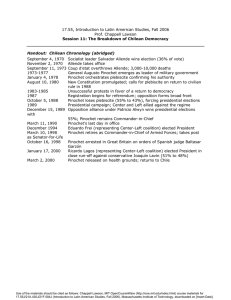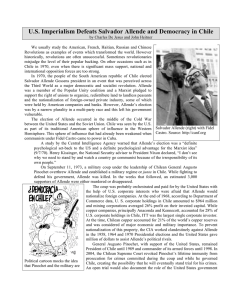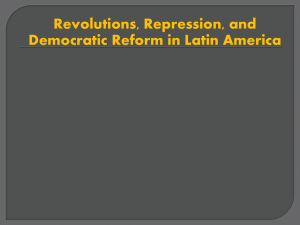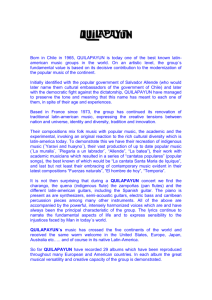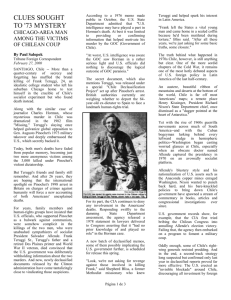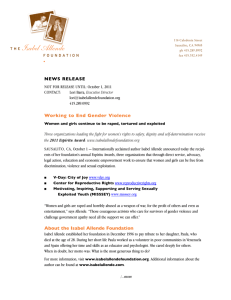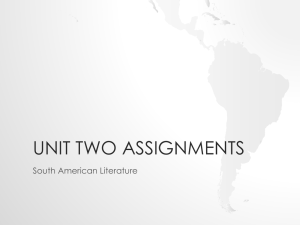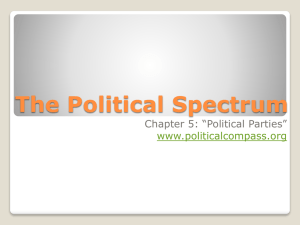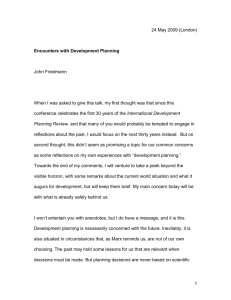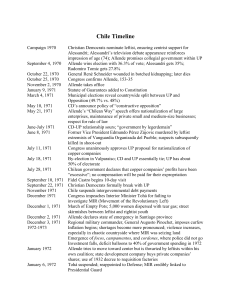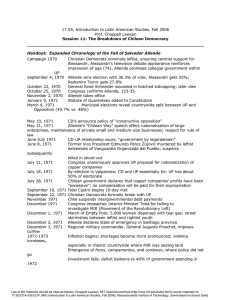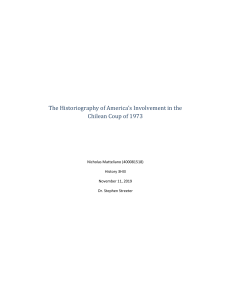Chile - UBC Blogs
advertisement
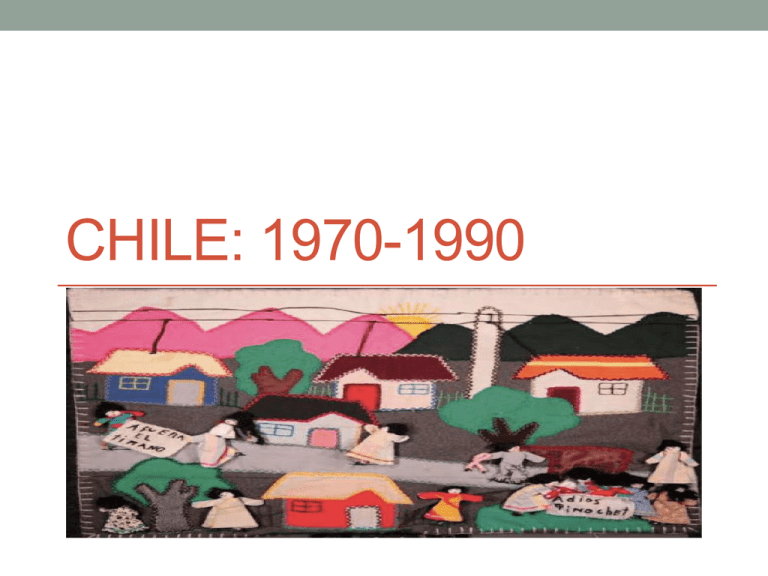
CHILE: 1970-1990 Background • Since it’s independence from Spain in 1818, Chile was one of the most politically stable countries in Latin America, as well as one of the most conservative. • By the 19th C. There were two main political “Conservative” and “Liberal”, both from the same social class. Differences stemmed from issues of secularism and Urban/Rural division. The “Radical Party” split off from the liberals in 1863 and pushed for further secularization of the country. (Civil Registries, Marriages, etc.) • Between 1818 and 1970 the country suffered only two coups, one against Jose Manuel Balmaceda in 1891 and against Arturo Alessandri by Carlos Ibanez de Campo in 1925. The 20th Century • The Communist Party founded in 1922 by Luis Emilio Recabarren, drawing on Marxist principles. • Following the Spanish Civil War of the 1930s, Spanish republicans emigrated to Chile. • By the 1950s, the Radical Party shifted to the right taking an anticommunist stance under Gabriel Gonzalez Videla. (19481952) Pablo Neruda sent into exile. • 1964. Eduardo Frei Montalva (Christian Democratic Party) elected president. Administration puts into practice progressive social reforms including economic redistribution and university reforms. These would be axed by Pinochet following 1973 coup. • Allende Presidency 1970-3 • Socialist Salvador Allende elected president of Chile in 1970 after three campaign attempts. (inc. 1964) • Supported by coalition of Leftist parties called the Unidad Popular. (Communist, Socialist, Radical Left, MAPU, MIR,) Elected with 36 % of the vote. • Congress had to approve presidential choice. CIA tried to prevent this from occurring (Track 1) • Presidency involved nationalization of major industries (banks, copper and mining) government administration of health care and education and expansion of land reforms under Frei. • First year of Allende’s presidency saw positive economic results. Inflation dropped 12%, wages raised 54%, GDP up 8%, unemployment dropped to 3%. • Economic plan relied on monetary expansion and price fixing which eventually increased inflation by 140% in 1972. 300% in 1973. • Shortages of consumer goods, particularly food staples. People forced to wait in long lines for goods. Black markets sprang up. • Nixon Administration cuts off foreign aid to Chile after Allende’s election. Some help from USSR. • Transport company strikes begin in October of 1972 both due to inflation crisis and paid off by the CIA and paramilitary groups inside Chile (Patria y Libertad). Paralyzes country. • 1970: Head of Chilean Military (General Rene Schneider) assassinated (CIA involvement. Schneider replaced with Carlos Pratts. • CIA develops “Two track” plan to prevent Allende from ‘turning Chile into another Cuba’. Track one: to convince congress to name Jorge Alessandri as President. Track 2: to find military officers willing to support a coup. • March 1973, Allende’s popular support increases to 43 percent in Parliamentary elections. • Christian Democrat Party separates from coalition, throws its support behind rightist National Party, holds a vote to remove Allende from office, fails. • June 1973: Military attempts “Tank Putsch” coup or “tanquetazo”, put down by Augusto Pinochet and General Prats. • August 1973: Allende gives General Prats Ministry of Interior position in government to quell unrest and increasing strikes. Prats quits two weeks later. Augusto Pinochet takes his position. • September 1973: Allende floats the idea for a plebiscite to decide the future of his presidency set for the 18th of September. On September 11th, military stage a coup, bomb presidential palace. Allende gives one final address to the nation and then commits suicide. The Coup and Repression “Workers of my country, I have faith in Chile and its destiny. Other men will overcome this dark and bitter moment when treason seeks to prevail. Go forward knowing that, sooner rather than later, the great avenues will open again and free men will walk through them to construct a better society. Long live Chile! Long live the people! Long live the workers! These are my last words, and I am certain that my sacrifice will not be in vain, I am certain that, at the very least, it will be a moral lesson that will punish felony, cowardice, and treason.” • Salvador Allende Final Radio Broadcast. • Military Junta assumes control of the country. Junta originally consisted of the four heads of the four branches of Chile’s armed forces. Pinochet as head of the army is named head of the Junta. • By1974, Pinochet “named” president. Designates a cabinet composed almost entirely of military personnel. • Pinochet suspends all political activity. Dissolves congress, suspends all political parties and nation’s 1925 constitution. • Formally bans all leftist political parties. Thousands of leftists rounded up, imprisoned and disappeared in the first three months following the coup. Witnesses describe “bodies floating in the Mapocho river” as common occurrence. • • • • • • • • • • • • • • • • There are five thousand of us here in this small part of the city. We are five thousand. I wonder how many we are in all in the cities and in the whole country? ... How hard it is to sing when I must sing of horror. Horror which I am living, horror which I am dying. To see myself among so much and so many moments of infinity in which silence and screams are the end of my song. Víctor Jara, "Estadio Chile" (translated from Spanish) • Conservatives estimates place the number of disappeared at around 3,000. Some suggest as many as 10,000. Another 30,000 were victims of torture and 200,000 sent into exile. • Initially makeshift prisons were set up on the ship La Esmeralda, Colonia Dignidad Chile Stadium. Later prison camps were established at Dawson Island, Villa Grimaldi, Pisagua and Chacabuco. • Repressions created an atmosphere of terror and (self) censorship. Breakdown of language and shared sense of history. • • Pinochet restructured the economy with U.S. following advice from the “Chicago Boys” imposing a neoliberal programme of fiscally conservative, free market practices. • Large sectors of the Chilean economy were privatised with the exception of copper, which remained in government hands. • Junta fixed exchange rates in the early 1980’s which collapsed domestic production and flooded the market with imported goods. • Cuts/privatisation of health care lead to increased social problems among lower classes. • In 1980, Pinochet drafts a new constitution in order to legitimize takeover of the country by declaring it “transitional”. (“voted” in by 66% of the population) • New constitution also contains plan for a plebiscite to be held eight years from its ratification which would “re-elect” Pinochet for another eight year term. • Additionally, Pinochet’s constitution included provisions for the military to have perpetual involvement in the government including veto power over legislation and two Senate seats to be designated for Generals of the armed forces. • Economic collapse of 1982 unemployment surged to 20%. 16 out of 50 financial institutions declared bankruptcy. Government forced to nationalize banks. Social unrest increases, people begin active protests against regime. Art During the Regime • Chile in the 20th Century produced multiple canonical works of literature in Latin America. By 1972, two poets had won the Nobel Prize for Literature (Gabriela Mistral, 1945 and Pablo Neruda, 1971) Other important literary figures of the region included Vicente Huidobro and Nicanor Parra. It was also the region that initiated the “Nueva Cancion/Canto Nuevo” movement in folk music which would be picked up across Latin America. • Salvador Allende’s government supported the arts. Allende financed publishing houses which would produce books at low cost, as well as art/poetry workshops in poor communities. Artists also supported and campaigned for Allende during his election and presidency. • Following the coup, many artists and writers fled into exile. • Literature split into two types, “Exile literature” (focused on historical events and testimony) and “Interior literature” (focused on subjective alienation). • Two major works of exile literature dealt with the coup allegorically. These are Casa de campo by Jose Donoso and La casa de los espiritus by Isabel Allende • Interior writers such as Raul Zurita, Diamela Eltit and Nicanor Parra addressed crises of language and meaning as the result of the coup. • Music also split in two general directions: • Post-coup nueva cancion (produced mostly in exile. Groups such as Inti-illimani and Quilapayun continued writing and producing music about Chilean situation) • Interior music, more influenced by mass-media, quasi- political or referential. “Los Prisioneros” “Sol y Lluvia” “Los Jaivas”
